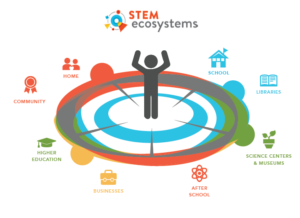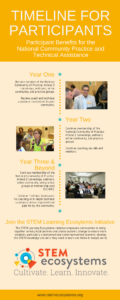Initiative builds regional partnerships between educators, community leaders, and corporations to improve STEM learning and career readiness
(Corona del Mar, CA – March 19, 2018) – Organizations and partners that provide education in science, technology, engineering, and math (STEM) are encouraged to submit a regional application to become a member of the STEM Learning Ecosystems Initiative to improve their collaborative effectiveness. A STEM Learning Ecosystem is cultivated through cross-sector partnerships which may include preK-16 schools, after-school and summer programs, science centers, museums, corporations, non-profit organizations, and more.
non-profit organizations, and more.
The STEM Learning Ecosystems Initiative is supported by the STEM Funders Network (SFN). There are now 56 Ecosystems across North America; several additional communities will be selected from among new applicants to join the project.
Ecosystems receive individualized Technical Assistance and coaching based on their regional assets and dynamics. They also gain access to a lively Community of Practice which shares ideas and best practices from one area to the next. STEM Learning Ecosystems are making education more relevant to emerging career paths by helping communities move from dialog about regional collaborations to implementation of action plans that impact students in the short and long-term.
“Opportunities in STEM fields abound: technology is evolving at a breakneck pace, and jobs are changing faster than ever. Education must prepare students to creatively address current and future challenges, but sadly, most schools use archaic systems that don’t do that,” said SFN co-chairs Gerald Solomon, Executive Director, Samueli Foundation, and Ron Ottinger, Director, STEM Next. “Students in areas with a STEM Learning Ecosystem benefit from a creative teaching infrastructure that yields relevant, forward-thinking education.”
“It might sound simple to connect regional partners, but there’s a lot more involved than exchanging business cards at a networking lunch. Creating systemic change requires deep consideration of the role of each partner in addressing regional and national learning and workforce priorities. Then, these changes must be successfully integrated into the classrooms,” said Jan Morrison. As Founder and CEO of TIES, her team’s Design Studios™ are the foundation of regional Ecosystem work.
Interested communities should review the online application details. All groups must:
- Complete the brief online Interest Form.
- Participate in two STEM Learning Ecosystems informational webinars on March 27 and April 10, 2018. (Participation in the webinars is recommended to allow for Q&A, but content will be accessible online and may be reviewed at another time.)
- Upon invitation, complete and submit the online application by May 1, 2018.
Communities that are selected will join 56 other STEM Learning Ecosystems in a National Community of Practice and receive technical support and coaching. They will gain access to:
- National convenings hosted by the STEM Funders Network (with registration, meals, travel and hotel provided for two members per site)
- Collaboration via a robust web-based platform featuring discussions based on STEM practice groups and regional membership
- Sharing of relevant peer-developed resources such as documents and teaching tools
- Monthly webinars with national, state and regional speakers (including grantmakers, STEM experts, cross-collaboration experts, education policy experts)
Applications are due by 5:00pm PT on Wednesday, May 1, 2018.
The STEM Learning Ecosystems Initiative cultivates and supports 56 local Ecosystems working to improve access to high-quality STEM learning for all students. The Initiative empowers communities to bring together unlikely local partners and create systemic change to ensure more students, particularly underserved and underrepresented students, develop the STEM knowledge and skills they need to learn and thrive in today’s workplace.
Learn more at stemecosystems.org. Join online conversations on Twitter @STEMecosystems and #STEMEcosystems, on Facebook and LinkedIn. Address specific questions about joining STEM Learning Ecosystems to info@stemecosystems.org.
STEM Ecosystems supporting members of the STEM Funders Network include: Broadcom Foundation, Burroughs Wellcome Fund, Overdeck Foundation, Qualcomm Foundation, Samueli Foundation, Schusterman Foundation, Simons Foundation, Steinman Foundation, STEM Next (supported by the Noyce Foundation), and the TGR Foundation.
###


